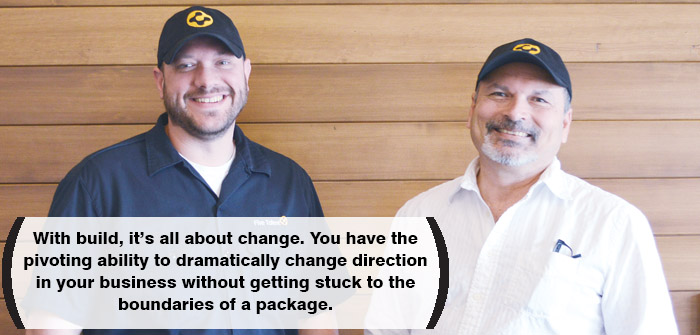(Photo above: (L-R) Ryan Comingdeer and Preston Callicott of Five Talent | courtesy of Five Talent)
Company leaders face this decision more often than they’d like and it’s not going away. How do you navigate the build vs. buy question and ensure you get a system that adapts and evolves as you do? Five Talent CEO Preston Callicott and CTO Ryan Comingdeer dive into the debate:
CEO
It really comes down to economies of scale and the pace of change in your market. Do you want a system that can adapt and pivot when you need to? Because off-the-shelf-solutions can be rigid, requiring you to adapt your processes to theirs. If you want to scale your business quickly, build is the way to go.
Market sectors evolve so rapidly now that if you invest in a package system that fits your criteria in 2014, by 2016 your criteria might have pivoted so dramatically that the system no longer adapts to it. In that scenario, you’ve adapted your entire business process to a system that no longer works for you. There are massive costs involved to change it or start over. It’s even more costly when you think about the time and business opportunities you lose while you’re doing it.
Buying a package can make sense when your business follows well-defined industry practices and innovation isn’t part of your game plan. For example, in mortgage banking, policies and procedures have changed very little in the last 30 years. Innovation also happens slowly enough in that industry that packaged solution vendors can provide necessary updates. Another instance is traditional sales pipeline management. As a SaaS service, Salesforce.com has created a rich ecosystem with 3rd party solutions that address most sales scenarios. But if your company doesn’t follow the traditional sales pipeline process, it falls short.
With build, it’s all about change. You have the pivoting ability to dramatically change direction in your business without getting stuck to the boundaries of a package. There are no boundaries. Also, when you build a custom system, that intellectual property is yours. It can increaseyour company’s valuation and become acritical part of your competitive advantage.
CTO
Mobile apps are a good example of why protecting your IP is crucial. If you need to build an app and get it to market quickly, you can buy a mobile app builder and build it on the fly. This seems like an easy short-term solution, but if it takes off you have no IP and it’s out of your hands. When you build a custom app, you have total ownership of what you develop. Sometimes there is a compelling business case for putting something into place immediately, where building it just won’t satisfy that timeline. However, that can be an expensive trade off.
I certainly don’t think you should build everything from scratch, as there are some good tools out there to build on for companies. We build custom software here at Five Talent, but we also rely on some package solutions to provide a good foundation and set of common functionality. The bottom line is that you’ve got to spend time figuring out what your processes are before deciding what you really need.
For example, off-the-shelf software can give you a defined process if you don’t have one yet for your business. As your partner, it’s our job to know the buyside products inside and out. This means that if a packaged product is a better fit, we will steer you towards it.
However, as your company changes and evolves, you’ll be spending more and more to customize that package to meet your needs. And if you decide to step away and build your own, transitioning all of your data can be complicated and very expensive.
Last, buy packages have a lot more security issues because hackers know their weaknesses and will go after them. As a result, if there’s a breach, it’s a big breach across the whole system. In contrast, custom-built softwareis essentially a black box to hackers, and that makes it much more secure.
BUILD IT
Pros
• Gives you exactly what you want
• Helps you innovate where others don’t
• Allows easy incorporation of 3rd party solutions
• Adapts and pivots with you
• Improves valuation/competitive advantage
• Secure
Cons
• Higher cost
• Potentially longer implementation
• Need to understand your processes first
• Requires staff or vendor support
• Once you’re in, hard to let go of
BUY IT
Pros
• Lower upfront costs
• Defines processes for you
• Follows industry practices, which creates a workforce skilled in the packaged solution
• Time to market could be faster
• Overall market pressures can drive useful new features
• Customer support
Cons
• Rigid
• End up with external manual processes and silos of data if it doesn’t fit your processes
• Target for hackers
• Costly to customize
• Exporting data is messy and expensive
• Lowest common denominator for feature sets means there are numerous features you’ll never use
Five Talent
1001 SW Emkay Drive, Suite 120
Bend, OR 97702
541-639-3620
www.FiveTalent.com




